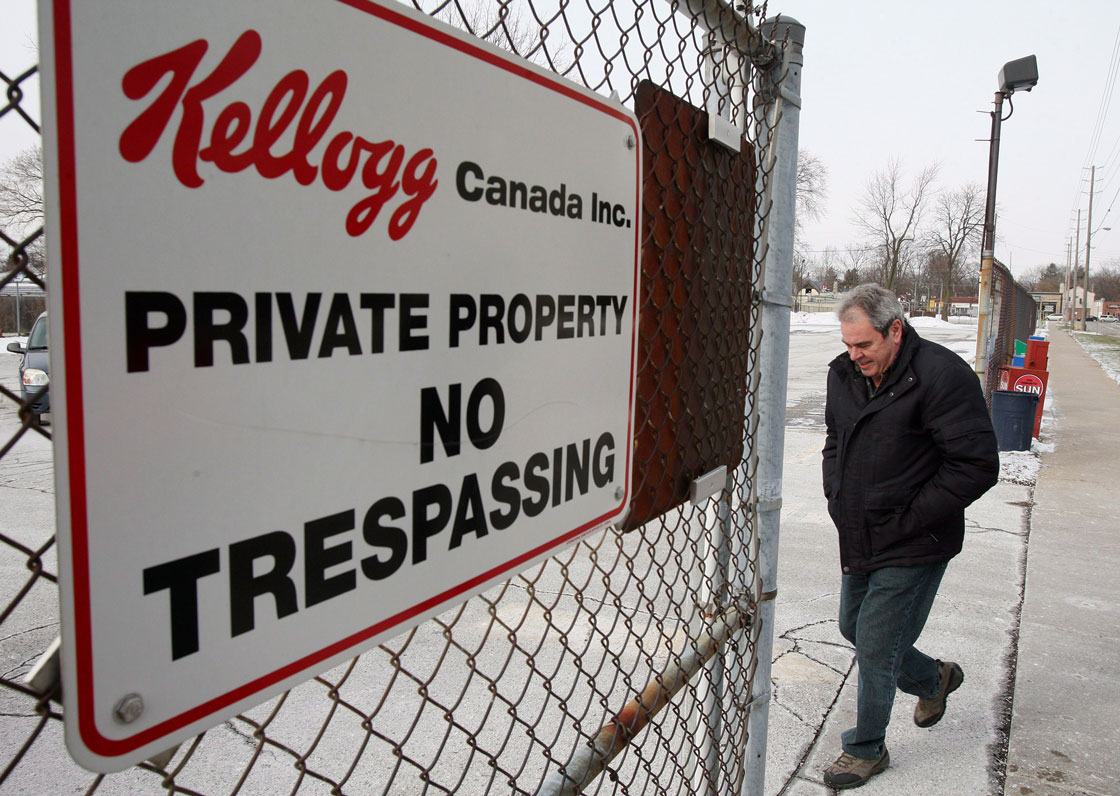For the past 32 years, Larry Baird has risen each weekday and made the same short commute to his factory job at Kellogg’s in London, Ont.

That routine will abruptly end later this year when the 90-year-old facility is closed and the 50-something Baird is forced into an early retirement.
Michigan-based Kellogg says the move will save the company millions a year and let the breakfast cereal maker expand capacity at a newer plant in Thailand.
The closure will also see another 500 well-paid positions evaporate in southwestern Ontario, a region of the country hit hardest by a wave of mass layoffs in recent months that has underscored with brutal clarity the “transition” in Canada’s economy away from factory jobs, experts say.
“They’ve been here for 90 years, and they’ve been a great employer,” Baird lamented last week. “There’s five generations of workers that have gone through there.”
READ MORE: Heinz strikes ‘fair’ deal with Ontario ketchup workers
“The structural challenges that Central Canada faces, in particularly Ontario, in shifting away from manufacturing, it’s a significant development for the whole of the economy because Ontario is such a significant source of population and GDP,” Tyler Meredith, the director of research on labour market policy for Montreal-based Institute for Research on Public Policy, said.
- ‘Shock and disbelief’ after Manitoba school trustee’s Indigenous comments
- Canadian man dies during Texas Ironman event. His widow wants answers as to why
- Several baby products have been recalled by Health Canada. Here’s the list
- ‘Sciatica was gone’: hospital performs robot-assisted spinal surgery in Canadian first
But with an eye toward balancing the books in order to potentially lavish tax cuts on voters in 2015, there won’t be much in the way of new help for the freshly unemployed from the Conservatives’ budget announcement on Tuesday, even as those ranks have unexpectedly swelled in recent months.
WATCH: Conservative budget priorities come under fire in the House of Commons Monday
“We’re looking at a stand-pat budget,” Craig Wright, chief economist at Royal Bank of Canada said.
Meredith said he doesn’t expect an increase in the $3.0 billion or so that is earmarked for retraining programs for unemployed workers this year, much of which is for recipients of employment insurance aid.
READ MORE: Bombardier laying off 1,700 from plane division
There could be new details on the controversial Canada Job Grant, the retraining initiative launched in last year’s federal budget.
The program’s been held up by disagreement between Ottawa and the provinces over funding and implementation methods. Ottawa has a counter-proposal in front of it now that calls for a deadline for the grant to kick in to be delayed to Oct. 1, from the proposed start date of April 1.
The provinces also want the new system to be fully phased in over six years rather than the federally proposed four-year timeline.
“That will significantly affect the design of training programs across the country,” Meredith said.
There may be some new if modest funding for programs to attract younger workers into trades under apprenticeship programs, and a reaffirmation on spending on big infrastructure projects that will create new construction jobs, experts say.
In October’s Throne Speech, the Conservatives touted their $70 billion pledge to improve, expand or remake key infrastructure like Toronto’s congested subway lines, the Windsor-Detroit crossing and the Evergreen Line in Vancouver over the next several years, something that will “create jobs across the country” in the process.
Still, with an unemployment rate stuck at 7.0 per cent (down from 7.2 per cent in December) and more layoffs on the horizon, Baird said it would be nice to see the Conservatives put more effort now into job creation measures rather than campaign planning.
“I don’t know what they’re going to do at the federal level,” Baird admits.




Comments